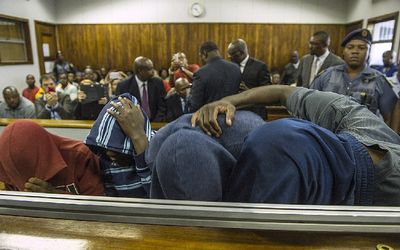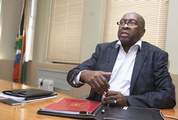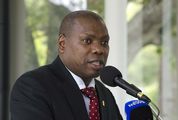THE murder of Emmanuel Sithole in Alexandra, Johannesburg, has the danger of offering us the simplicity we desperately crave whenever beloved SA threatens to fall apart. There are four suspects — Mthinta Bhengu, Sifundo Mzimela, Sizwe Mngomezulu and Ayanda Sibiya — all between the ages of 18 and 22, controversially displayed on the front pages of a Sunday newspaper for all to see. There is a victim with a name. There will be a court case that could redeem us all should the suspects be pronounced guilty.
But we should resist the temptation to reduce the past few weeks of violence to an issue of criminality. Prejudice has a long history in SA; in fact, the very foundations of the country were principled on state-sanctioned prejudice. Racial and other classifications forced South Africans to find exceptionalism in their identity in a scramble for better positions. In its darkest days, the state controlled who people could love and be intimate with.
In 1994, we called ourselves the Rainbow Nation and forgot that this was an aspiration and not yet a goal achieved. But scars don’t just go away, and when we react with shock and surprise when old demons haunt us, we expose our own naivety about what it would take to truly become a different SA.
In 2011, Nontsikelelo Tyatyeka’s body was found decomposing in a wheelie bin in her neighbour’s yard months after she had been reported missing by her family. It was suspected the murder was a lesbian hate crime. In 2012, Thapelo Makutle, a 23-year-old former Miss Gay Kuruman, was killed and mutilated in Seoding. Part of his testicles and penis had been cut off and stuffed into his mouth. Last month, there were reports of a 40-year-old woman whose husband had used superglue to glue her private parts shut. SA is reported to have a rate of intimate femicide that is five times higher than the global average.
Hate crimes are a common occurrence and range from sexism to homophobia, religious intolerance, domestic issues and the abuse of vulnerable groups such as people with disabilities. Poor communities carry the disproportionate weight of hate crimes. A study conducted by OUT LGBT3 Well-being in collaboration with the Joint Working Group found that, for black people, hate crimes occurred mainly in public spaces such as main roads, taxi ranks, bus stops, parks and railway stations, in contrast to white people, who experienced hate crimes in workplaces, victims’ homes, and pubs and clubs.
Yes, this is an extremely violent society. Academic literature suggests that economic distress precedes armed conflict and political violence as people try to assert themselves in a situation that has left them feeling powerless. The majority of South Africans have been subjected to continuous economic distress, high unemployment rates plague young South Africans and, though poverty has steadily declined, it affects a large section of our society.
However, violence, discrimination and socio-economic conditions are not mutually exclusive; they constantly intersect to create a perfectly deadly cocktail.
In our attempt to understand and resolve the violence being meted out to vulnerable foreign nationals, let us avoid the temptation to dismiss the complexities of our problems and risk repeating mistakes. Eventually we won’t even believe ourselves. When we fail to appreciate the true nature of the problem, we also dismiss the full lived experience of millions of people.
As we undertake another round of public dialogues on these recent attacks, let us remember that issues must be dealt with distinctly but not independently of one another. Let’s put them all on the table and be honest about how the positions we hold in our various spaces have contributed to this moment.
• Ndlovu is part of Youth Lab, works at the National Planning Commission and writes in her personal capacity.

Men suspected of killing Mozambican vendor Emmanuel Sithole in Alexandra township in an apparent xenophobic attack try to hide themselves as they are arraigned at the Wynberg Magistrate's Court in Johannesburg on Tuesday. Picture: AFP PHOTO/MUJAHID SAFODIEN
THE murder of Emmanuel Sithole in Alexandra, Johannesburg, has the danger of offering us the simplicity we desperately crave whenever beloved SA threatens to fall apart. There are four suspects — Mthinta Bhengu, Sifundo Mzimela, Sizwe Mngomezulu and Ayanda Sibiya — all between the ages of 18 and 22, controversially displayed on the front pages of a Sunday newspaper for all to see. There is a victim with a name. There will be a court case that could redeem us all should the suspects be pronounced guilty.
But we should resist the temptation to reduce the past few weeks of violence to an issue of criminality. Prejudice has a long history in SA; in fact, the very foundations of the country were principled on state-sanctioned prejudice. Racial and other classifications forced South Africans to find exceptionalism in their identity in a scramble for better positions. In its darkest days, the state controlled who people could love and be intimate with.
In 1994, we called ourselves the Rainbow Nation and forgot that this was an aspiration and not yet a goal achieved. But scars don’t just go away, and when we react with shock and surprise when old demons haunt us, we expose our own naivety about what it would take to truly become a different SA.
In 2011, Nontsikelelo Tyatyeka’s body was found decomposing in a wheelie bin in her neighbour’s yard months after she had been reported missing by her family. It was suspected the murder was a lesbian hate crime. In 2012, Thapelo Makutle, a 23-year-old former Miss Gay Kuruman, was killed and mutilated in Seoding. Part of his testicles and penis had been cut off and stuffed into his mouth. Last month, there were reports of a 40-year-old woman whose husband had used superglue to glue her private parts shut. SA is reported to have a rate of intimate femicide that is five times higher than the global average.
Hate crimes are a common occurrence and range from sexism to homophobia, religious intolerance, domestic issues and the abuse of vulnerable groups such as people with disabilities. Poor communities carry the disproportionate weight of hate crimes. A study conducted by OUT LGBT3 Well-being in collaboration with the Joint Working Group found that, for black people, hate crimes occurred mainly in public spaces such as main roads, taxi ranks, bus stops, parks and railway stations, in contrast to white people, who experienced hate crimes in workplaces, victims’ homes, and pubs and clubs.
Yes, this is an extremely violent society. Academic literature suggests that economic distress precedes armed conflict and political violence as people try to assert themselves in a situation that has left them feeling powerless. The majority of South Africans have been subjected to continuous economic distress, high unemployment rates plague young South Africans and, though poverty has steadily declined, it affects a large section of our society.
However, violence, discrimination and socio-economic conditions are not mutually exclusive; they constantly intersect to create a perfectly deadly cocktail.
In our attempt to understand and resolve the violence being meted out to vulnerable foreign nationals, let us avoid the temptation to dismiss the complexities of our problems and risk repeating mistakes. Eventually we won’t even believe ourselves. When we fail to appreciate the true nature of the problem, we also dismiss the full lived experience of millions of people.
As we undertake another round of public dialogues on these recent attacks, let us remember that issues must be dealt with distinctly but not independently of one another. Let’s put them all on the table and be honest about how the positions we hold in our various spaces have contributed to this moment.
• Ndlovu is part of Youth Lab, works at the National Planning Commission and writes in her personal capacity.



















Post a comment